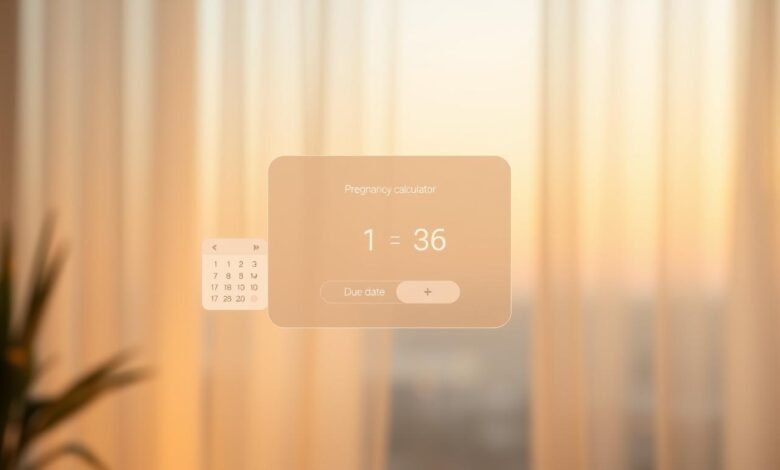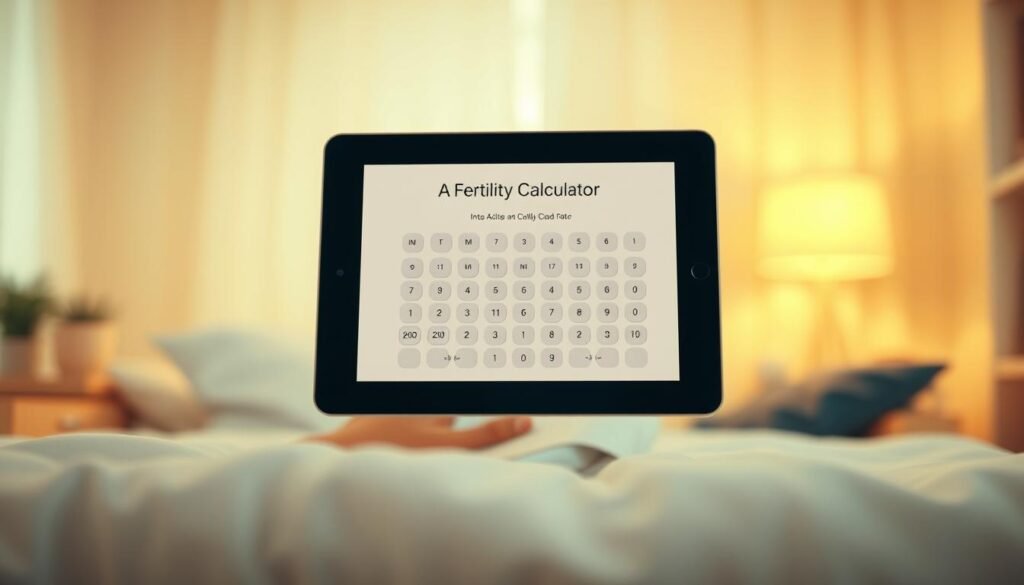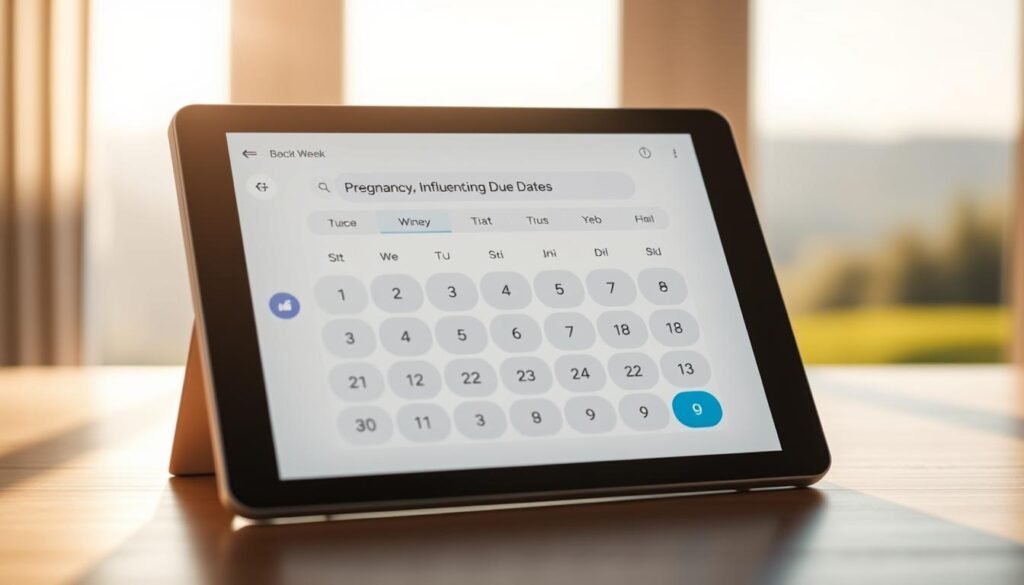Pregnancy Calculator: Estimate Your Due Date

Are you excitedly waiting for your baby to arrive? Wondering when that special day will be? A pregnancy calculator or due date calculator can give you an estimate. Most pregnancies last about 40 weeks.
Our calculator can figure out your due date based on your last menstrual period, conception date, or IVF transfer date.
Want to plan ahead? Use an ovulation calculator to help you. Only about 4% of babies are born on their estimated due date. So, it’s good to have a rough idea of when your little one will arrive.
Our calculator is here to help you estimate your due date. Start preparing for your baby’s arrival!
What is a Pregnancy Calculator?
A pregnancy calculator helps you guess when your baby will arrive. You can enter the date of your last period, when you conceived, or when you had an IVF transfer. It’s great for finding out how far along you are or when to take a pregnancy test.
Understanding Its Purpose
The main goal of a pregnancy calculator is to give you an estimated due date. Knowing your due date helps you plan for your baby’s arrival. You can schedule doctor visits, plan your leave, and prepare for your baby’s birth.
How It Works
A pregnancy calculator uses a complex formula. It considers your last period, menstrual cycle length, and conception date. By inputting this info, you get a close estimate of your due date. You can use a pregnancy week or conception calculator for a more precise guess.
Why Calculate Your Due Date?
Figuring out your due date is a thrilling part of pregnancy. It’s key for planning and getting ready for your baby’s arrival. You can use a fertility calculator to guess your due date and understand your pregnancy better. Knowing your due date lets you plan for your baby’s birth, like picking a hospital and a pediatrician.
A gestational age calculator helps you see your baby’s age and growth stage. This info is vital for tracking your baby’s growth and ensuring they get the best care. With your due date in mind, you can emotionally and physically prepare for being a parent.

Using fertility and gestational age calculators keeps you updated on your pregnancy. They help you make smart choices about your care. By figuring out your due date and knowing your baby’s development, you’ll feel more ready and confident for your baby’s arrival.
| Pregnancy Stage | Weeks | Development |
|---|---|---|
| First Trimester | 1-12 | Organ formation and growth |
| Second Trimester | 13-26 | Sensory development and movement |
| Third Trimester | 27-40 | Final preparations for birth |
How to Use a Pregnancy Calculator
Using a pregnancy calculator is simple. Just enter the date of your last period, when you conceived, or your last ultrasound. Our calculator will then estimate your due date. This helps you plan for your baby’s arrival.
Step-by-Step Guide
First, pick the method that fits you best. You can use your last period, conception date, or IVF transfer date. Our calculator will give you an estimated due date. You can also find out when you’re most fertile with an ovulation calculator.
Different Methods Available
Keep in mind, different methods might give slightly different due dates. But using a mix of methods can give you a closer estimate. For example, if you have a regular cycle, use the LMP method. If you’ve had IVF, use the IVF transfer date method. With the right tools, like a pregnancy calculator, you’ll feel more ready for your pregnancy.
Factors Influencing Due Dates
When you use a pregnancy week calculator to guess your due date, remember some things can change it. Your menstrual cycle length and when you ovulate are big factors. If your cycle is not regular, guessing your due date might be harder. Our conception calculator considers these to give a close estimate.
A pregnancy test calculator can also help figure out your due date from your last period. But, remember, these estimates aren’t always perfect because everyone’s cycles are different. Knowing these factors helps you plan better for your baby’s arrival.

Every pregnancy is special, and your due date is just a guess. Stay updated and talk to your healthcare provider if you have any questions or worries about your pregnancy.
Benefits of Using a Pregnancy Calculator
Starting your pregnancy journey is exciting. Using a fertility calculator or a gestational age calculator can help. They let you guess your due date and make smart choices for your health.
Recent studies show that these tools encourage better choices. Knowing your due date helps you plan for your baby’s arrival. You can track your baby’s growth with a gestational age calculator.
Also, a fertility calculator shows your most fertile days. This is great for women with unpredictable cycles. Together, these tools give you a precise due date and help you plan your pregnancy.
Every pregnancy is different. It’s key to stay informed and talk to your doctor often. With a pregnancy calculator and tracking your milestones, you can have a healthy and joyful pregnancy.
Common Misconceptions About Due Dates
When you use a pregnancy calculator to guess your due date, remember that it’s just an estimate. Only about 4-5% of babies are born exactly on their due date. This can change based on your menstrual cycle length and when you ovulate, which you can track with an ovulation calculator.
A due date calculator gives you a guess, but it’s not always right. Due dates can be off by up to 5 weeks. Things like your age and health at conception can also affect how long you carry your baby. For instance, older moms often have longer pregnancies than younger ones.
Also, your past pregnancies can shape your current one. If your previous pregnancies were shorter or longer, your current one might be too. By knowing this and using a good pregnancy calculator, you can get ready for your baby’s arrival. You’ll also make better choices about your pregnancy care.
Pregnancy Milestones You Should Know
As you go through your pregnancy, knowing the key milestones is important. A pregnancy week calculator helps track these moments. It also lets you plan your pregnancy in a way that suits you. Knowing your due date, estimated by a pregnancy test calculator or conception calculator, is key for getting ready for your baby.
In the first trimester, your baby’s organs and systems start to form. This is a vital time. Keeping track of your menstrual cycles helps guess your due date more accurately. By week 8, your baby is about 0.5 inches long. By week 12, they are 2.5 inches long and weigh about 1/2 ounce.
Knowing about your pregnancy milestones connects you to your baby. It also prepares you for what’s coming. With a pregnancy week calculator and your due date, you can be more involved in your pregnancy. You can make better choices about your care.
Apps and Tools for Pregnancy Tracking
As you journey through pregnancy, you’ll find many apps and tools to help you. A fertility calculator can guess your due date. A gestational age calculator gives insights into your baby’s growth. The BabyCenter app is a great choice, with features like a due date calculator and pregnancy tracker.
When picking a pregnancy app, look at its accuracy, how easy it is to use, and if it fits your needs. The What to Expect app gives daily updates and info on baby growth. The Pregnancy + app shows 3-D baby animations and offers daily tips on nutrition and labor.
Here’s a comparison of some popular pregnancy apps:
| App | Features |
|---|---|
| BabyCenter | Due date calculator, pregnancy tracker, community forums |
| What to Expect | Daily updates, week-by-week insights, baby development tracker |
| Pregnancy + | 3-D animations, daily nutrition and labor information |
![]()
Consulting with Healthcare Providers
Using a pregnancy calculator to guess your due date is just a start. Your healthcare provider can give you personalized advice and check on your health and your baby’s. They will have more precise info than a calculator.
Your healthcare provider will look at your last menstrual period, ultrasound results, and other details to guess your due date. This way, they can give you a more accurate guess. While a pregnancy calculator can help, talking to a healthcare provider is best for the most accurate info.
Some things, like irregular periods or health issues, can make due date guesses less accurate. Your healthcare provider can consider these and give you a better guess. By using a pregnancy calculator and talking to your healthcare provider, you’ll understand your due date better and know what to expect during your pregnancy.
| Calculator Type | Description |
|---|---|
| Pregnancy Calculator | Estimates due date based on last menstrual period |
| Due Date Calculator | Provides a more accurate estimate of due date using ultrasound measurements and other factors |
| Ovulation Calculator | Helps determine when ovulation is likely to occur, which can be used to estimate due date |
Conclusion: Embrace Your Journey
Starting your pregnancy journey is exciting and full of anticipation. Remember, your due date is just an estimate. Every pregnancy is unique. Stay positive, take care of your body, and get ready for your baby’s arrival.
The conception calculator is a good start, but don’t focus too much on the numbers. Celebrate every milestone, from the first movement to the final countdown. Soon, you’ll hold your baby in your arms. Trust the process, lean on your support system, and enjoy every moment of this journey.
Source Links
- Pregnancy Due Date Calculator – https://www.whattoexpect.com/due-date-calculator/
- Pregnancy Due Date Calculator – https://www.babycenter.com/pregnancy-due-date-calculator
- Methods for Estimating the Due Date – https://www.acog.org/clinical/clinical-guidance/committee-opinion/articles/2017/05/methods-for-estimating-the-due-date
- How are Due Dates Calculated – https://intermountainhealthcare.org/blogs/how-are-due-dates-calculated
- How To Calculate Your Due Date – https://my.clevelandclinic.org/health/diagnostics/22052-due-date-calculator
- How to Calculate Your Due Date – https://www.healthline.com/health/pregnancy/your-due-date
- Pregnancy Due Date Calculator – How Many Weeks Am I? | Pampers – https://www.pampers.com/en-us/pregnancy/due-date-calculator
- Pregnancy Calculator – https://www.calculator.net/pregnancy-calculator.html
- Due date calculator: Predict your baby’s delivery date | Flo – https://flo.health/tools/due-date-calculator
- Patient education: Pregnancy due date calculator (Beyond the Basics) – https://www.uptodate.com/contents/pregnancy-due-date-calculator-beyond-the-basics/print
- How Ovulation and Due Date Calculators Help in Pregnancy Planning? – https://www.beststartupstory.com/how-ovulation-and-due-date-calculators-help/
- Working out your due date – https://www.pregnancybirthbaby.org.au/working-out-your-due-date
- 3 Common Myths About Due Date Calculations and 40 Week Pregnancy | Mamaway Maternity – https://www.mamaway.com/blog/post/baby-due-date-3-common-myths-about-due-date-calculations-and-40-week-pregnancy
- Why your estimated due date might need a rethink – Dr Sara Wickham – https://www.sarawickham.com/articles-2/why-your-estimated-due-date-might-need-a-rethink/
- Who’s most likely to get an inaccurate due date? – Dr Sara Wickham – https://www.sarawickham.com/research-updates/whos-most-likely-to-get-an-inaccurate-due-date/
- Due Date Calculator | Huggies® US – https://www.huggies.com/en-us/resources/pregnancy/due-date/due-date-calculator
- Fetal development: What happens during the 1st trimester? – https://www.mayoclinic.org/healthy-lifestyle/pregnancy-week-by-week/in-depth/prenatal-care/art-20045302
- Pregnancy App & Baby Tracker – Apps on Google Play – https://play.google.com/store/apps/details?id=com.babycenter.pregnancytracker
- The Best Pregnancy App for Every Part of Your Pregnancy Journey – https://www.glamour.com/story/best-pregnancy-apps
- Pregnancy Calculator, Due Date – https://apps.apple.com/us/app/pregnancy-calculator-due-date/id1596723294
- Pregnancy Calculator: Calculate Due Date, Weeks, Months, Conception Date, & all Milestones by LMP – https://www.doctorzara.com/pregnancy-calculator/
- Pregnancy Calculator: Calculate Your Pregnancy Week & EDD Date | Max Hospital – https://www.maxhealthcare.in/calculator/pregnancy-due-date
- Pregnancy Calculator Due Date Revealed: Unlock Your Journey – https://atricapharma.com/pregnancy-calculator-due-date/
- Pregnancy Due Date Calculator & Pregnancy Scan Calculator – https://gynecologistvizag.com/pregnancy-due-date-calculator/
- Pregnancy Calculator | Carol App for Mums – https://www.carol-app.com/pregnancy-calculator





It’s so interesting to see how flexible the due date can be, considering only a small percentage of babies are born exactly on that date! This really emphasizes the importance of being prepared and flexible during pregnancy.
This pregnancy calculator is clear and easy to use, helping expecting parents feel prepared and confident.
One helpful tip is to use the estimated due date to plan your baby’s first wardrobe—consider whether you’ll need cozy layers or lightweight outfits based on the expected season.
That’s why we created a helpful baby dressing guide that suggests newborn outfits based on both due date and weather forecast—practical support to keep little ones cozy and comfortable from day one!